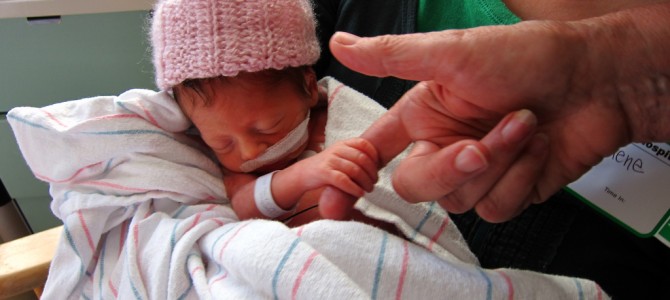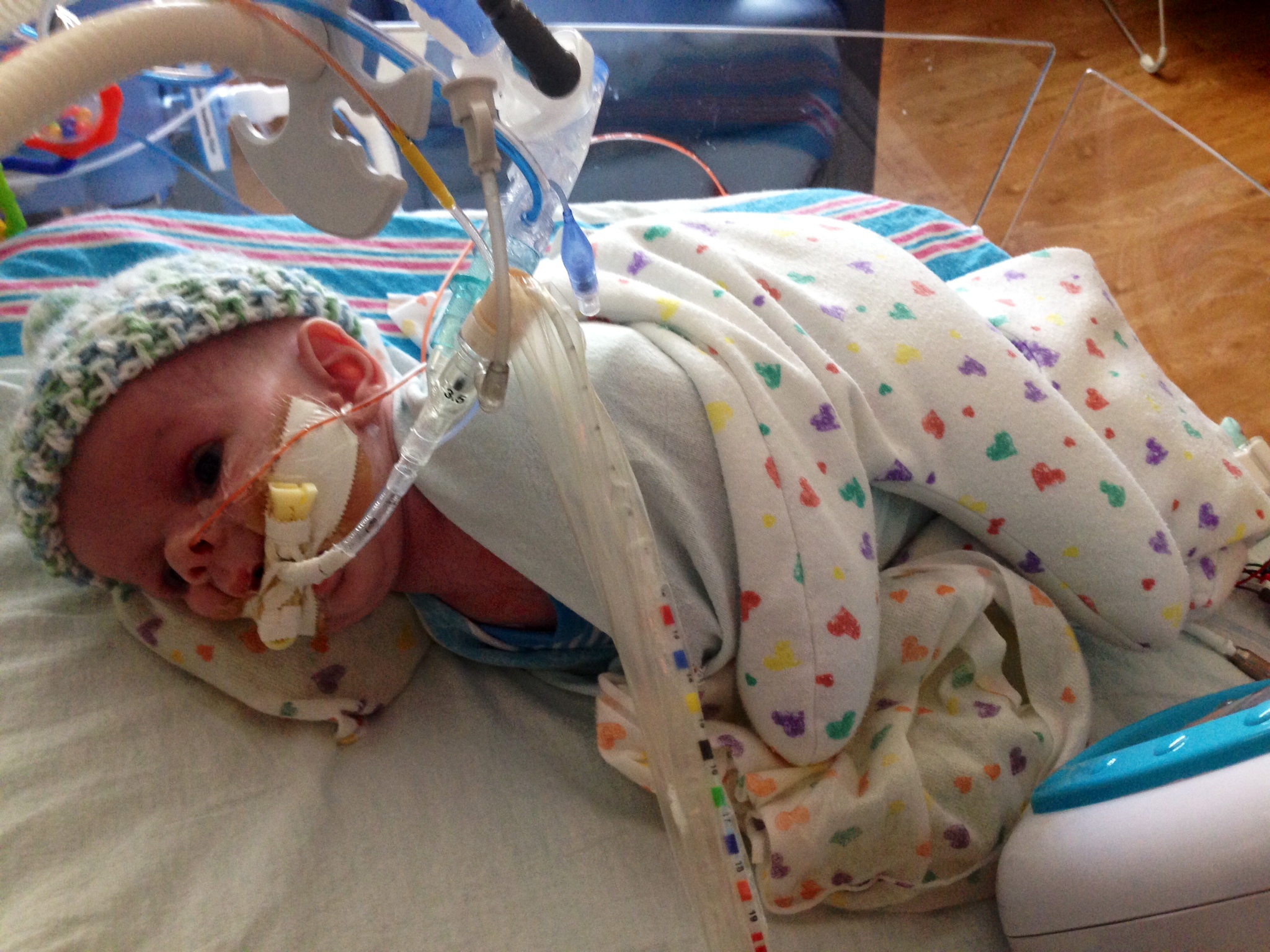
Gentle lighting casts a glow across the perfect, healthy, Caucasian newborn who sleeps in a cocoon of white blanket. The photographer has captured the baby-ethos that tugs on the heartstrings of any member of the human race with half a heart, and it is hard to look at the picture without an inward, “Aww.” The text that is superimposed over the photo says, “Not a mistake. Not a problem. Not a burden. Not an inconvenience. Not a nuisance. Not an accident. Not a punishment.” Then, in larger font, “A miracle.” It is all very lovely. And yet when I see the meme in my facebook feed, it makes me, a pro-life advocate and an ardent fan of babies, a little uncomfortable.
“Baby J” is one of the reasons. His picture has also been posted to my feed. In his photograph, he lays in a hospital bed, his little face partially obscured with tubes and tape. This six-week-old has already undergone heart surgery. He depends on a ventilator to keep his lungs open, is expected to spend life breathing through a tracheotomy tube, and has been rejected by his biological family. He currently has no relatives to visit him in the hospital. The adoption agency that has posted information about “Baby J” states he will do best with a family that can provide one-on-one, lifelong care. Unlike the baby in the pro-life meme, this little guy does not glow beneath the lens of a camera.
 There is a disconnect between the images. The first is meant to convey that babies ought to be loved and cherished. It successfully evokes a feeling of warmth, and prompts an emotional response along the lines of, “How could anyone fail to want a beautiful baby like this?” It even makes me want to revisit my own son’s newborn photos, because babies are breathtaking little creatures. Yet I don’t think most advocates of “choice” believe themselves to be supporting abortion for this kind of obviously-wanted, apparently perfect baby. In their eyes, they are trying to prevent situations in which babies are unwanted, tragically damaged, and set up for a life of limitations and suffering. I fear they may misinterpret “pretty-pretty” Facebook memes as evidence that the pro-life position is divorced from reality.
There is a disconnect between the images. The first is meant to convey that babies ought to be loved and cherished. It successfully evokes a feeling of warmth, and prompts an emotional response along the lines of, “How could anyone fail to want a beautiful baby like this?” It even makes me want to revisit my own son’s newborn photos, because babies are breathtaking little creatures. Yet I don’t think most advocates of “choice” believe themselves to be supporting abortion for this kind of obviously-wanted, apparently perfect baby. In their eyes, they are trying to prevent situations in which babies are unwanted, tragically damaged, and set up for a life of limitations and suffering. I fear they may misinterpret “pretty-pretty” Facebook memes as evidence that the pro-life position is divorced from reality.
The Logic of Barbarism
Indeed, if the pro-life movement were so shallow as to feel compassion only for theoretical, abstract, pretty babies, or so sentimental as to think eliminating abortion would provide a fuzzy blanket and a happy ending for every child, it would be of little use to children or society. Being pro-life is about far more than can be captured in a well-lit Facebook image. It is about avoiding the many tempting promises of barbarity. Both sides in the abortion debate are aware the world is full of things that ought not to be. Babies should not be ill, dependent on tubes for survival, exposed to drugs or alcohol in utero, born into poverty in crime-infested neighborhoods, or rejected by their biological families.
In one sense, we can both agree such children “should not exist.” Yet the solution is not to eliminate (that is, murder) these babies while they are most vulnerable. Doing so is to fall into the understandably human, but absolutely wrong, logic that was used by a group of third-grade boys in my classroom when they asked why, since the Middle East is always fighting and wants to hurt America, we don’t just nuke the whole region to end the problem.
Barbarians respond to the world’s brokenness by doing what seems necessary to protect either themselves personally or their group as a whole. In ancient Carthage, for example, parents sacrificed newborns to the gods. These parents were human beings who surely felt as much of an impulse to protect their children as any other human being does, and presumably would not have given their babies to the gods unless they thought it was a necessary sacrifice, just as today there are loving parents who think they also must sacrifice a baby.
The End of Human Rights
Barbarism is perilously natural. It comes so easily. We look at the world, see a thing that should not be, and attempt to force the world into a better shape. For instance, we see a woman whose life is a tragedy: she is willing to commit a crime for a few dollars, her brain is permanently damaged by drugs, her various boyfriends are physically and emotionally abusive, and any children she bears will probably be sucked into the same vortex of dysfunction. It seems so logical to say that such a woman “should not” have babies, and that society has the right to sterilize her as it sterilized thousands of “feeble-minded” citizens in the heyday of the eugenics movement. It makes so much sense to push her into an abortion through the threat of punishment should she deliver another child into the world. After all, she is hurting not only her children, but the larger society that surrounds them.
We gaze through the windows of a nursing home and see rows of old people who shuffle painfully from room to room, avoided by their guilt-ridden relatives, short on hair and cognitive function. We step into a hospital and note a severely depressed, middle-aged bachelor whose life is an endless round of pain and procedures. While he waits for the end, thousands and thousands of dollars are spent on his care. Surely these things also should not be. It is tempting to think that the logical thing to do is to end these people’s suffering in the only way available to mere humans.
Barbarism sounds logical, but it fails to make the world a better place, either in the national sphere or the domestic one. When we act as if other people’s fundamental human rights fall on a sliding scale based on their relationship with or value to the group (or to ourselves), no one’s human value is secure. Such an approach leads to philosophies like that of atheist thinker P. Z. Myers, who declares there is no inherent moral reason to restrict abortion to pre-born babies. He says a society would be morally justified (although brutal) if it also allowed the abortion of young children who cannot yet meaningfully contribute to the group. The thing is, barbaric logic leads to—well, to barbarism, in which each individual lives only for himself. Barbarism is tragic. It is the Steubenville rape case. It is abusers who post child porn on Reddit. It is saying that the solution to children like “Baby J” is to make sure they do not survive gestation.
From Child Sacrifice to Self-Sacrifice
This brings us back to the heart of being pro-life. To reject the sacrifices of barbarism is to accept self-sacrifice. The adoption agency that posted “Baby J’s” picture has reported a flood of applications from people interested in adopting him. The care he will require will not be easy, and his adoptive family will surely need to give up enjoyable aspects of their lifestyle they might otherwise have taken for granted. As a culture, we are sometimes so quick to coo over happy endings that we fail to recognize the real support and hardship involved. Let us be thankful for those among us who not only care for their own, but who take on the sacrificial burden of caring for those whom they make their own.
I know a family whose church bulletin once included a notice about a six-year-old who needed a home. The child will never advance beyond the developmental capability of a toddler, and will always require attentive care. Knowing that such a commitment would probably pass beyond their own lives into that of their children, this family asked each of their kids if they were onboard with this adoption. As a family, they took on that challenge. That is what being pro-life means.
Being pro-life can also lead to unique suffering that is not always remembered in the conversation on adoption. Annery, a blogger who writes about life in her home, has also written about how openness to life led her family to foster a little girl. This child lived with them until the age of two-and-a-half, when the courts discovered a biological parent and returned the girl to that parent’s custody. Annery and her family are now cut off from the child they have raised as their own. Her daughters have lost a sister. It is difficult to imagine their devastation. Yet, incredibly, they have decided yet again to open their home to another child in need. They are willing to sacrifice so that they might love. This, too, is what being pro-life means.
Of course, not everyone who values life is called to the same sacrifice or the same role. In fact, realism about one’s own capabilities is part of what divides sentimentality from useful action. There are many ways of being pro-life. They range from viewing parenthood as a vocation; to teaching young people that human value does not depend on health, beauty, or appearance; to giving up some of our own daily comforts and preferences to help those who are weaker, poorer, sadder, or otherwise in need of help. No pro-life meme can ever be a satisfactory presentation of such a comprehensive approach to life.
Abortion is a terrible thing. Yet as we fight to protect our weakest citizens from death in their mother’s womb, we must remember we cannot guarantee them happy endings. The babies whom we wish to save will not all be happy, healthy children who will be adopted by picture-perfect, loving families. Some of them will grow up in tragic circumstances. Some will suffer tragic illnesses. All of them, one way or another, will face the brokenness of life in this world. Knowing this, all we can do is give. Barbarism takes. Civilization gives. It is the essence of civilization to say that the weakest, least beautiful among us are precious beings who must be protected, even when this requires sacrifice from the strong.
That is what pro-life means.









